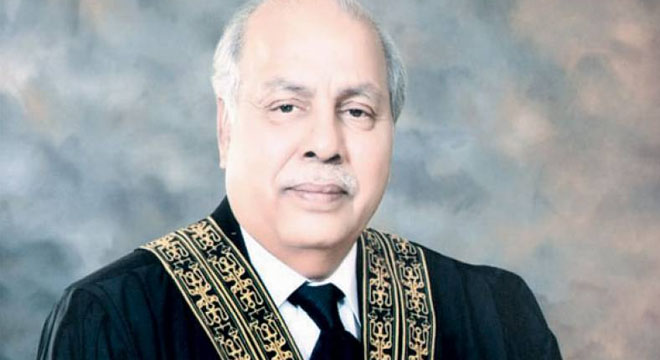| CJP asks what will happen if a party gets votes disproportionate to MPs | ECP will be responsible if party position in assemblies not reflected in Senate: Justice Ijaz
ISLAMABAD – The Supreme Court of Pakistan Wednesday noted that secrecy for the elections of the Senate or National Assembly elections is not perpetual.
A five-member bench of the apex court headed by Chief Justice of Pakistan Justice Gulzar Ahmed and comprising Justice Mushir Alam, Justice Umar Ata Bandial, Justice Ijaz ul Ahsan, and Justice Yahya Afridi conducted hearing of the reference regarding holding of the Senate election either through “secret ballot” or “open ballot”.
During the hearing, Justice Ijaz said that the reply does not address the fundamental question asked by the court. He asked that what does the secrecy means in National Assembly and Senate elections. He added that the secrecy is never absolute or to remain till the end of the world. He asked from the counsel to show through the Constitution or the judgments of the apex court that the secrecy is perpetual. The ECP counsel was further asked to examine the definition of secrecy in the Black Law Dictionary.
Justice Mushir Alam said that the secrecy provided in the Section 178 of Election Act, 2017, is limited. The secrecy is before the polling or marking of the ballot-paper and inserting it to the ballot-box. He said that after the polling day the votes remain in the custody of the ECP.
Barrister Sajeel submitted that the Commission is of the view that secrecy means complete secrecy, perpetual and not to be shared. Marking the ballot paper identifiable with any mark will be breach of secrecy of the ballot and violation of Article 226.
He stated that according to Section 81 of the Act, election under this Act shall be held by secret ballot subject to the provisions of Sections 93, 94 and 103. The Commission deliberated the secrecy of ballot in the light of Sections 81, 185 and Article 226 of Constitution.
Attorney General for Pakistan Khalid Jawed proposed that instead of serial number unique bar codes be printed on the ballot-papers for Senate election. He added that in case of horse-trading the vote could be traceable through the barcode.
With the onset of the proceeding, Barrister Sajeel Sheryar Swati on behalf of the ECP submitted the revised report saying it is more comprehensive and detailed. He said that the steps were taken in past and will be taken in the light of the Supreme Court directions to curb the corrupt practice.
He submitted that the vigilance committee comprising officials of Federal Board of Revenue, State Bank of Pakistan, Federal Investigative Agency, NAB and NADRA constituted to assist the Commission in discharge of its duties and has formulated terms of reference for the committee. The candidate would have to submit an affidavit that he is not indulged in the corrupt practice and distributed money among its electors. The code of conduct has been prepared for the election, which will be sent to all the political parties for their consideration. The complaint cells have been set up in Islamabad and the provincial headquarters. The opposition candidates and the public at large can file complaint against the candidate electronically.
Justice Ijaz said that it is the mandate of the ECP to hold elections under Article 218(3) of Constitution fairly, honestly and justly. He said that the moment the proportional representation is violated then the ECP will be responsible.
The Chief Justice questioned that if any political party gets votes in Senate which are disproportionate to its members in the National and the Provincial Assemblies then what will happen? Justice Ijaz said that the ECP will be responsible if the party position in the National and Provincial Assemblies is not reflected in the Senate. He added that such situation jams the system.
The judge said that the Constitution has mandated the Election Commission of Pakistan to hold elections justly, fairly, honestly and in accordance with law and corrupt practice be guarded against. Justice Ijaz said that in Article 51 direct and free vote is mentioned for the elections of the National Assembly members, but in Article 59(2) the system of proportional representation by means of single transferable votes is given for election of the Senate members.
However, Justice Afridi noted that if the party position in the National Assembly and the Provincial Assemblies has to be reflected in the Senate then why not its members are selected through parties’ lists as it done in the case of minorities and the women, whose elections is also through proportional representation.
Justice Afridi said that the word ‘election’ is used for the senators, which is through proportional representation by single transferable vote.
The attorney general and the advocate general Khyber Pakhtunkhwa have concluded their arguments and now the PPP Senator Raza Rabbani and AGs of Punjab, Sindh and Baluchistan will make their submission from today.
Follow the PNI Facebook page for the latest news and updates.









